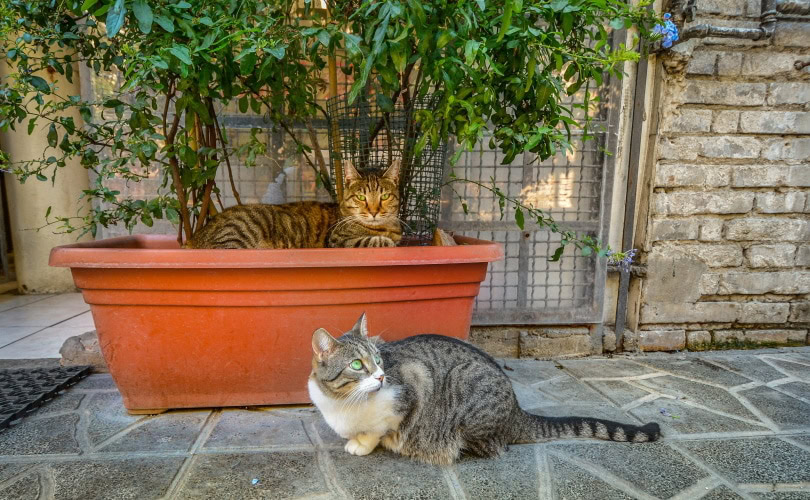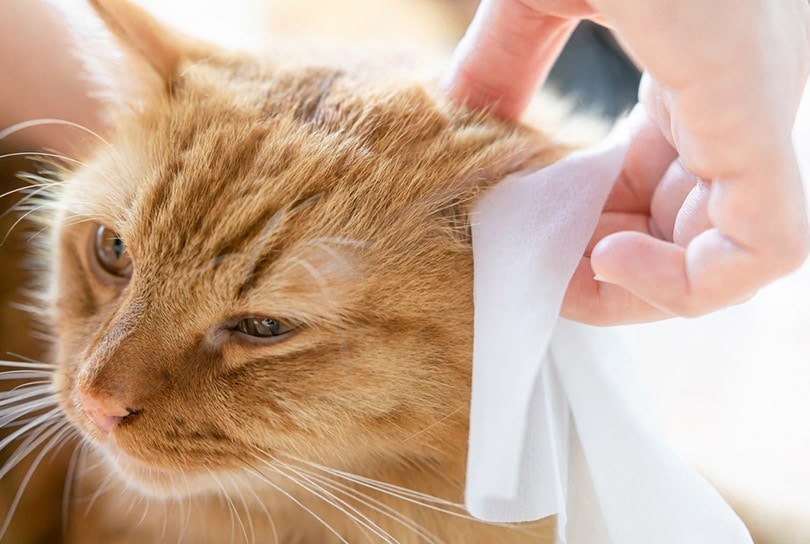VET APPROVED

The information is current and up-to-date in accordance with the latest veterinarian research.
Learn more »Look, you’re an animal lover — really! But that doesn’t mean you’re okay with your house being party central for all the strays in your neighborhood. Even the most ardent cat lover is likely to have their patience tested by a never-ending stream of stray cats, so it’s understandable that you’d want to take action to prevent them from claiming your house as their own.
In this guide, we show you exactly how to keep stray cats at bay without resorting to cruelty or violence.

The 9 Ways to Keep Cats Away from Your House
1. Use Unpleasant Odors
There are certain smells that, for whatever reason, cats simply don’t like. You can use these odors to your advantage by lining your property with them, making your home a place that’s no fun to visit.
You can make a simple, homemade cat repellent by mixing 1 cup of water and 1 cup of vinegar with dish soap, then putting it in a spray bottle and spritzing it around your home. Pay special attention to any areas that the cats already like to frequent, like your garden or under your porch. Be careful, though, as this mixture can kill plants, so watch where you spray it.
Cats also don’t enjoy the smell of citrus, so you can try planting lemon trees or something similar. If you aren’t looking for that much of a commitment, simply spreading orange peels around the edges of your property may work too.
There’s also a plant called “the scaredy-cat plant,” although its official name is Coleus canina. Cats hate the smell of the thing, so planting it in high-traffic areas may do the trick. However, there’s a reason that cats hate the smell: It smells like skunk, so this may be a case of the solution being worse than the problem.
2. Use Water

Cats don’t tend to like water, which is why so many people use spray bottles to prevent strays from taking over their property.
You can grab a bottle or a hose and do it yourself whenever you see a stray wander into your yard, or you can invest in a motion-sensor sprayer or sprinkler. Both of these strategies have their downsides, however.
If you do it yourself, you’ll have to actually catch the cats in the act of trespassing, and you’ll have to do it often enough for the deterrent to work. This can be a big time commitment on your part, and it will make you look like a real Scrooge to the rest of the neighborhood if they see you doing it.
The motion-sensor sprayers are more convenient, but the kinks haven’t been entirely ironed out of the technology yet. They often fail to spray when they should or worse, spray things they shouldn’t — like neighbors, the mail carrier, or even you. Also, if you have a dog or other pet that you want on your property, the sprayer might not be able to tell friend from foe.
3. Use Textures
Many cats are picky about what they’ll touch with their paws, and you can use this to your advantage by laying down textures that they find unpleasant, causing them to head elsewhere.
Sandpaper is a good choice, as most cats (understandably) hate the feel of it on their feet. You can lay down sandpaper anywhere they like to walk or on any surface that they jump on.
Double-sided tape and aluminum foil work well too, but they may not be ideal for outdoor use. Another option is to lay chicken wire in the ground, especially in your garden, as cats don’t like stepping on it.
You can even cover the ground with an unpleasant texture. Gravel, mulch, and pine cones are all things that cats don’t enjoy stepping on, so laying one of them down in a thick layer can be effective at deterring the furry little trespassers.
4. Use Coffee

Coffee grounds are a potent double-edged sword against cats because they provide both an unpleasant texture and odor, but they also make good fertilizer!
Cats don’t enjoy the smell of strong coffee, so buy the most paint-peeling roast that you can find. It’s more potent after it’s been brewed, so used coffee grounds are preferable to those straight out of the bag. Just keep in mind that caffeine is toxic to dogs and cats if ingested, so please try to put it in a way cats or other pets can not access it.
5. Use Spice
Cayenne pepper, like coffee, is a two-for-one solution. Cats don’t like the gritty feel on their paws, but more than that, they don’t like having their nose or mouth irritated by the heat that gives off.
You can sprinkle a little cayenne on any surfaces that the cats like to sniff or chew on. It shouldn’t take long for them to get the hint and bug off.
While this solution should be effective, some people may feel that it’s needlessly cruel. It’s up to you — the cayenne shouldn’t do any lasting damage, but the cats will definitely be in a world of hurt for a few minutes.
6. Use Sound
There are various ultrasonic devices that purportedly deter cats and other small creatures (even insects). They work by emitting an unpleasant sound at a high pitch that humans can’t hear but most animals can’t stand.
This is a great solution — if it works. However, there’s not really any evidence that suggests that such a strategy will be effective, and reviews on such products are filled with people claiming that the device did nothing or worse, actually attracted the animals that it was supposed to deter.
If the device does prove effective, it will punish other small animals in the area, like your neighbors’ cats and dogs, so it might be best for users living in isolated locations.
7. Remove Anything That Attracts Them

If you have more strays in your yard than anyone else in the area, chances are that something is attracting them to your home. Try to figure out what that thing is and remove it.
They may be attracted to your garden or your kids’ sandbox, as cats are always looking for fresh new litter boxes. If that’s the case, you’ll have to ask yourself just how attached you are to your hobby (or how attached your kids are to playing in cat poop).
It’s also important to keep your yard clean and well-maintained. An overgrown lawn will attract all sorts of animals that enjoy the cover, such as mice, birds, etc. This in turn, attracts stray cats, who enjoy killing and eating anything in their path. By depriving them of a food source, they’ll likely head elsewhere.
8. Get to Know Them
There’s a difference between a stray cat and a feral cat. Feral cats are wild animals that have never been tamed, and they should largely be avoided as much as possible, so hopefully, you can find a strategy that deters them.
Many strays, on the other hand, are domesticated pets with homes that they’ve wandered off from. If that’s the case, you should try to track down their owners.
If you find out that some of the cats trespassing on your property are just outdoor pets please talk with their owners and ask them to keep their cats off your property. If they won’t, you may have to seek legal recourse or contact animal control to have them taken to a shelter.
9. Get a Dog

Cats enjoy being predators, but they don’t like being prey. We’re not advocating letting your dog kill a cat, of course, but once the cats see that you have a big mutt in your yard, they may be less likely to come over uninvited.
However, this will likely only be effective when the dog is physically outside, as many cats aren’t bothered by the scent of canines. Also, once the cats realize that there are certain parts of the yard that the dog can’t reach (anything outside the fence, for example), they’ll learn to only visit those parts of the lawn.
Also, getting a dog is a serious commitment that will last for a decade or more, so don’t get one simply because you have cats in your yard. If you’re thinking about getting one, anyway, chasing off strays could be a happy bonus.

Conclusion
As much as we love our own pet cats, we may not like it when strays show up in our yard. Luckily, there are plenty of safe and natural ways to keep stray cats away. If you want to keep stray cats out of your yard, hopefully you’ll have success with one or more of these 9 methods.
Related Reads:
Featured Image Credit: Piqsels











